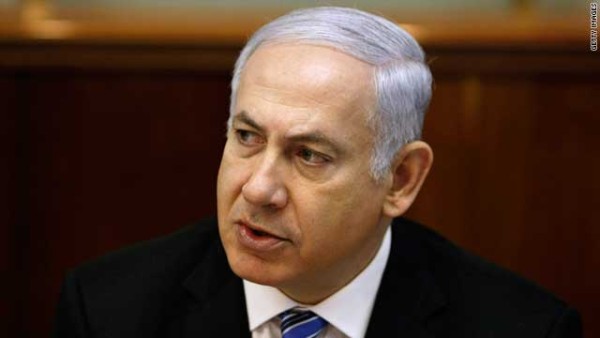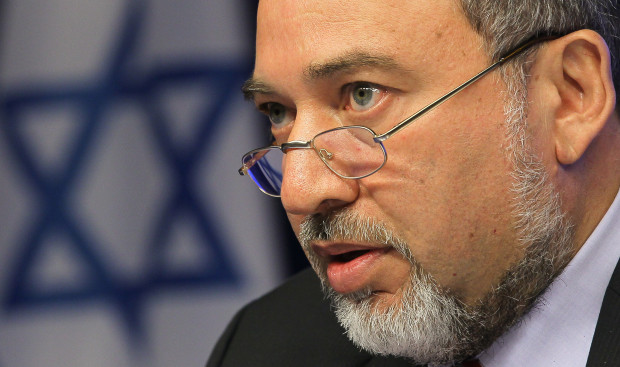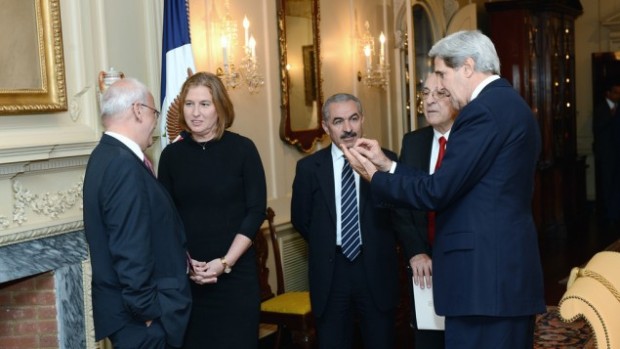To no one’s surprise, the peace talks between Israel and the Palestinian Authority are dead in the water, having expired on April 29, and the prospects for reviving them in a meaningful fashion are extremely slim, if non-existent.
At this point, it’s worth asking two relevant questions: Was it all a waste of time? Was it just a futile “process” rather than a real march toward peace?
Yes.

Israeli Prime Minister Benjamin Netanyahu suspended the U.S.-brokered negotiations on April 24 after the two main factions in the Palestinian national movement, Fatah and Hamas, signed a reconciliation agreement that empowers them to form a technocratic unity government within the next five weeks.
“Whoever chooses Hamas does not want peace,” Netanyahu declared. Israeli Foreign Minister Avigdor Liberman was even more emphatic, claiming that the deal signified that Israel has no Palestinian partner.

In actuality, the talks really collapsed on March 29, when Israel reneged on a promise to release the fourth and last batch of 104 Palestinian prisoners and the Palestinian Authority followed suit by applying to join 15 international conventions and treaties.
The United States, the sponsor and driver of the talks, attempted to resuscitate them, sending special envoy Martin Indyk back to the Middle East, but he returned to Washington, D.C. empty-handed.
The gap between the two sides widened still more when Israel and the Palestinian Authority resorted to brinkmanship.
Mahmoud Abbas, the president of the Palestinian Authority, listed three conditions for resuming the negotiations: the release of all Palestinian prisoners, a freeze in settlement construction in the West Bank and East Jerusalem and a new focus on drawing final boundaries between Israel and a future Palestinian state.

Reacting cooly to these demands, Israel stated that the talks would remain frozen until the Palestinians scrapped the accord with Hamas, whose charter calls for Israel’s destruction. By way of response, the Palestinians’ chief negotiator, Saeb Erekat, accused Israel of “sabotaging” efforts to achieve a two-state solution.
Reflecting on the impasse, John Kerry, the American secretary of state, blamed both sides for the breakdown.
In fact, Israel was primarily at fault.

From the moment the talks were launched by Kerry last summer, in a bid to hammer out a final-status agreement within nine months, Netanyahu reiterated his support for a two-state solution and pledged to work for a “historic compromise.”
It’s highly debatable whether he was sincere.
Netanyahu truly desires peace with the Palestinians, but only on his own terms. He’s like a potential customer who walks into a car showroom, finds a vehicle he likes and refuses to pay market value for it.
Put simply, Netanyahu does not want to pay the price for peace.
During the life of the sputtering talks, Netanyahu continued to expand settlements in the West Bank and eastern Jerusalem. He was, in effect, negotiating in bad faith. Peace Now, which carefully monitors Israeli construction in the occupied areas, released a report last week indicating that 13,000 new housing units were built from July 2013 until very recently on territory that should be part of a Palestinian state.

The ongoing construction was in keeping with Israel’s post-1967 policy of creating “facts” on the ground, thereby foreclosing the possibility of a geographically contiguous Palestinian state.
Despite Netanyahu’s verbal support for a two-state solution, his Likud party has never formally endorsed it. Indeed, the coalition he presides over contains ferocious opponents of Palestinian statehood. Viewed in that context, Netanyahu will never offer the Palestinians more than a territorially disjointed toy state, or a provisional state.
The Israeli politicians most opposed to genuine Palestinian statehood are Economy Minister Naftali Bennett, leader of the Jewish Home Party, and Foreign Minister Avigdor Liberman, head of the Yisrael Beiteinu Party.
Bennett has urged Netanyahu to annex Area C of the West Bank, where Israel maintains security and civilian control and where nearly all the settlements are located. Bennett, who hails from the religious nationalist camp, believes that the 150,000 Palestinians in Area C — a legacy of the Oslo peace process — should be granted limited autonomy as well as Israeli citizenship. “I know it;s not as sexy as the perfect two-state solution,” he said, “but this is realistic.”

Ironically, Bennett’s proposal would hasten Israel’s transformation from a Jewish state to a binational state, a scenario that greatly concerns Israel’s opposition leader, Isaac Herzog. As he put it on his Facebook page, “The time has come for Netanyahu to decide if he wants a Jewish state or a binational state.”
Communications Minister Gilad Erdan (Likud) concurs with Bennett, having called on Netanyahu to lay the groundwork for the annexation of Area C, which comprises about 60 percent of the West Bank.
Liberman, a settler himself, claims he’s a supporter of Palestinian statehood, but his advocacy of an interim accord falls considerably short of the two-state solution he supposedly backs. Liberman, a secular Jew, claims that Mahmoud Abbas is not a suitable partner, that he has engaged in “political terror” and that he follows a “no war, no peace” strategy.
The criticism is disengenuous, to say the least.
Like many of his ilk in the Israeli cabinet, including Defence Minister Moshe Yaalon, Liberman prefers conflict management to conflict resolution, which is not the outcome Kerry intended when he reconvened the stalled peace process last year.
Some Israeli ministers, notably Justice Minister Tzipi Livni of the Hatnua Party and Finance Minister Yair Lapid of the Yesh Atid Party, sincerely want to reach a peace agreement with the Palestinians. But their influence is minimal, and they carry little weight in Netanyahu’s cabinet.
Isaac Herzog, has called on Livni — Israel’s chief negotiator at the peace talks — and Lapid to leave the government and form a coalition with his Labor Party. But so far, they are not biting.
Nor is Netanyahu interested in dumping Bennett and Liberman, reaching out to more moderate parties and establishing a government capable of signing an equitable peace accord with the Palestinians.
As former defence minister Ehud Barak said a few years ago in a candid moment of crystalline clarity, this is a government incapable of resolving Israel’s historic conflict with the Palestinians.

Netanyahu and company have attacked the Palestinian leadership for having signed a reconciliation agreement with Hamas, pointing out, correctly, that it opposes a two-state solution. But a substantial number of his own ministers subscribe exactly to the same position, a glaring discrepancy he refuses to acknowledge.
Netanyahu, too, has displayed an astonishing level of hypocrisy regarding the concept of Palestinian unity. On the one hand, he rules out further negotiations if Fatah and Hamas unite. On the other hand, he has cautioned that the rift between Hamas and Fatah raises worrisome issues about Abbas’ ability to represent the Palestinians and implement a peace agreement.
In other words, Netanyahu has Abbas coming and going. Whatever he does will always be suspect in Netanyahu’s eyes.
Yet Fatah’s agreement with Hamas is, in fact, problematic.
Jibril Rajoub, a senior official in Abbas’ Fatah faction, has said that a Palestinian unity government would recognize Israel, renounce terrorism and accept all previous accords signed by Israel and the Palestinian Authority, thereby meeting the conditions set down by the Quartet, consisting of the United States, the European Union, Russia and the United Nations.
Hamas spokesmen, however, have asserted that Hamas will never recognize Israel’s existence, which is a huge and insurmountable problem.
The Palestinian Authority is also open to criticism because it did not formally respond to Kerry’s proposal for a framework agreement. Abbas claimed that Kerry’s ideas were too pro-Israel and therefore unacceptable. Israel had its reservations, too, but accepted the framework accord as a basis for talks.
With the peace talks having collapsed, Netanyahu can breathe a little easier. He no longer has to worry about recalcitrant ministers like Bennett and Liberman, who threatened to quit if Israel released more Palestinian prisoners — particularly 14 Israeli Arabs charged with terrorism — or agreed to a settlement freeze.
In the absence of a diplomatic track, Netanyahu may well take additional steps to consolidate Israel’s grip on the West Bank — measures his constituents would applaud.
For their part, the Palestinians can promote their case for statehood in the international community, which wholeheartedly supports a two-state solution. Having learned the lessons of the second Palestinian uprising, Abbas has spurned violence to attain independence and sovereignty.
Kerry has warned that the status quo, favored by Netanyahu until now, poses immense dangers to Israel. Absent a two-state solution, he observed, Israel may lose its capacity to be a Jewish democratic state and wind up as a despised and isolated “apartheid state.”
Such a state would be ostracized by the civilized world, not to mention liberal and progressive Jews in the Diaspora.
It’s not too late to restart peace talks from the point at which they ended. But for them to succeed, the Palestinians, and especially Israel, will have to rethink their respective strategies.
